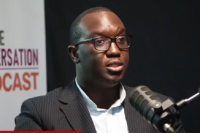Liuwa UPND member of parliament Situmbeko Musokotwane says the Seventh National Development Plan (7NDP) is under threat due to Zambia’s debt crisis.
But Minister of National Development Planning Alexander Chiteme says government is not in a hurry to perform as it will be given another opportunity to continue development projects in 2021.
Debtating the Ministry of National Development Planning budget in Parliament, Wednesday, Musokotwane said the debt situation had the left the 7NDP in disarray.
“A few months ago, somebody asked the Minister of Finance a question, ‘what is the performance like of the 7NDP’? I listened very carefully to what the Ministry of Finance was saying. In most cases, targets were less than 30 per cent of the intended target! Targets were in the region of the 20 and 30 per cent instead of the 100 per cent that was intended, why? Obviously, that was so because; One, the 7NDP that should be implemented by the Minister of Planning it is in total disarray! The Seventh National Development plan is in total disarray because that plan never envisaged that Zambia was going to be borrowing so much money to throw all over the place especially in roads! It was never intended that way. The 7NDP was a coherent document with intelligent interventions in all the sectors; interventions in education, interventions in health, interventions in water. The financial resource was carefully divided to carter for all those sectors,” Musokotwane said.
“In practice, the government ended up borrowing so much money so that now when it is time to fund those areas of need, there is no money because the money has gone to service the national debt. This where the problem is emerged. So the plan is in total disarray! The 7NDP is in total disarray because of the debt crisis that has emerged. Where was the Ministry of Planning when all this was taking place? They constructed the development plan, they made decisions on where the money was going to go but instead the money is going to one sector, roads in Lusaka. So where was the Ministry of planning? So therefore, the question was it worthwhile to have this Ministry when it is unable to coordinate things.”
He wondered whether separating the Ministry of National Development and Planning from the Ministry of Finance had achieved its intended purpose.
“In 2016, I believe there about, the Ministry (National Planning) was then separated to be a standalone Ministry. The question was it worth it? This question is important because in creating a Ministry, money is going to be utilized, money that would have otherwise been available to give us CDF. Instead, the money for CDF is being consumed by the Planning Ministry and other institutions. Money to hire teachers, money for all sorts of activities. So that resource was diverted to support a new ministry called planning. That is why it is important to ask the question was it worth it given all these opportunity costs that we have incurred? This is where the worry comes through; because we should be seeing things coming out from the ministry that tell us that ‘yes it was worth it’,” said Musokotwane.
And Chiteme said government was not in a hurry to perform, arguing that the 7NDP was at 34 per cent and that government was on course to realizing the plan.
“The implementation of the 7NDP is at 34 per cent. This, honorable Musokotwane, is the best ever implemented plan considering all the plans that Zambia had. Since we started doing development plans in this country. From all the plans, this 7NDP is the most successful plan. The plan runs from 2017 to 2021 we are in the middle of implementing the plan and already, we are the best planners, and remember, we had the fifth, sixth, sixth revised and now the 7NDP. And when we begin to talk about infrastructure development and when we begin to speak about achievements of the plan I should begin to say that when you stand to debate, you look from where you are coming from,” Chiteme said.
“And that is where we are standing strong as the PF government. Let me remind you that this government under President Lungu come 2021 we are coming back and the reason why we are coming back is that because this government has worked; this government has given people hospitals, this government has given people roads, this government is fighting the effects climate change, this government has invested into renewable energy, that will begin to see the effects come 2021. This government is not in a hurry to perform like the way some people performed like under formula one ah ah!”
He said the country would not have experienced load shedding if Musokotwane, who is a former finance minister, had planned ahead during his time in government.
“Today, we are looking at a growth of two per cent, when you (Musokotwane) were a minister of finance and planning we, had a growth of about 7.5 percent of GDP. But did we couple that with the development we see here? Today, we have the roads, today we have got the hospitals so instead of celebrating a figurative growth in GDP, look at the growth that PF has attained under the able leadership of the President Edgar Chagwa Lungu. So, when you begin to talk about planning honorable Musokotwane, which is not working in this government, even when you talk about load shedding, PF has only been in government seven years going into eight; if we had adequate plans in the Six National Development Plan and in the Sixth revised National Development Plan we shouldn’t be talking about load shedding today. Honorable Musokotwane you should have planned ahead! The Ministry of National Development Planning, which is only three years has achieved more than under the Ministry of Finance which you where presiding as minister,” said Chiteme.
“Government alone cannot fund the implementation of the 7NDP. That is why as government we are creating an enabling environment so that we invite private sector investments to bridge the gap into financing of the 7NDP. So when you begin to shoot down that government resources alone cannot finance, yes we are agreeing that government alone cannot finance the plan we need private sector involvement.”












